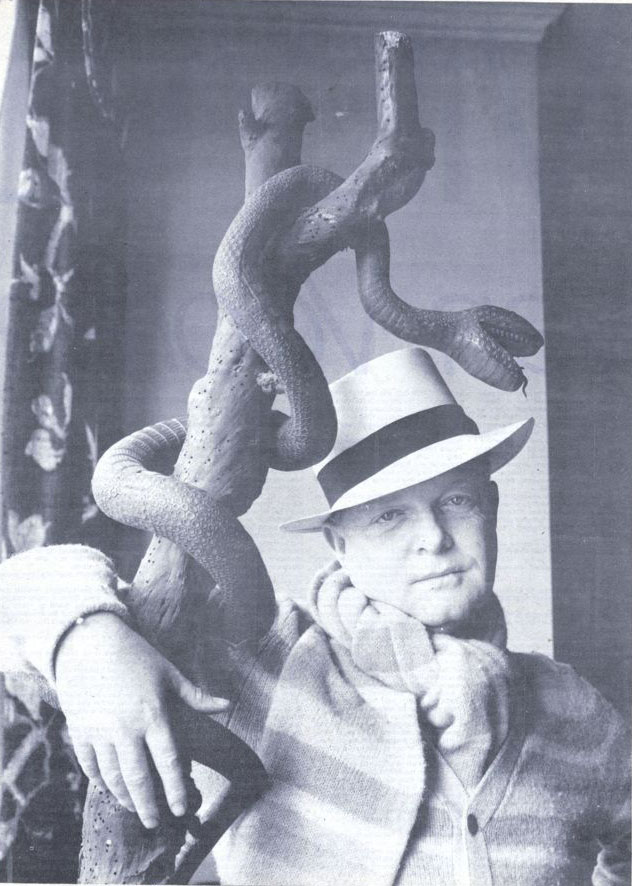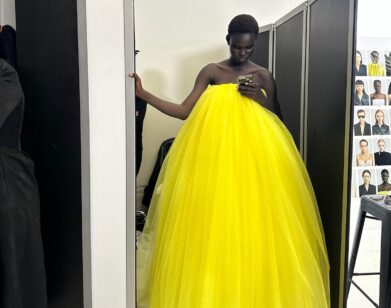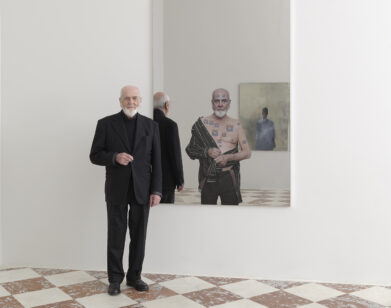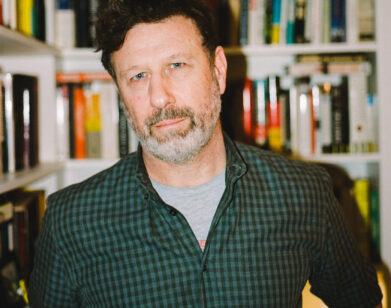New Again: Truman Capote

ABOVE: TRUMAN CAPOTE, AT HOME AT THE UNITED NATIONS PLAZA IN THE EARLY ’70S. PHOTOGRAPH BY HORST.
In New Again, we highlight a piece from Interview’s past that resonates with the present.
In Game of Thrones, Emilia Clarke plays Daenerys Targaryen—a silver-haired, displaced queen, clad in leather and dust and followed by a rag-tag army of shirtless men and bedraggled women. Before Thrones returns at the end of the month, Clarke will make her Broadway debut in a new revival of Breakfast at Tiffany’s. Clarke stars as Holly Golightly; clearly a call girl in Truman Capote’s original 1958 novella, and not so clearly a call girl in the 1961 Audrey Hepburn film.
Truman Capote—or Truman Streckfus Persons—was a great friend of Andy Warhol and Interview until his death in 1984. As yet another adaptation of his most famous story brings him back into the public consciousness, we decided to revisit the below Q&A with Capote from April of 1976. In it, Capote discusses Answered Prayers—a novel he would never finish—what makes a good writer, and if he considers himself a “dangerous friend.”
Capote: Answered Questions
Redacted by Chris Hemphill
Fresh from his movie debut in Neil Simon’s upcoming Murder by Death, Truman Capote sped in and out of the city, which won’t shut up about its first glimpse of his new novel, Answered Prayers. Dapper in black on black, Truman brought his one-man, three-act traveling talk show to NYU where a mixed audience of students and socialites heard him: 1) tell an extended favorite anecdote, 2) read an extended favorite short story, 3) answer questions. The first, naturally, was about Answered Prayers.
INTERVIEW: Why did you write it? Were you depressed at the time? I’m referring to something you wrote about all these wonderful people you knew.
TRUMAN CAPOTE: Are you talking about the chapter of my novel that was published recently? Was I depressed when I wrote it? Not at all! And was I depressed afterwards? No, not at all! It’s part of a novel—a very long and complicated novel. Why, did it depress you? I thought it was hi-larious! Well, did it?
INTERVIEW: I think so. I felt badly. I thought it was such a wonderful relationship you had with all these people.
CAPOTE: But who says who these people are? I don’t. You’re just assuming something.
INTERVIEW: How do they feel about it?
CAPOTE: I think they loved it. I only know one person who didn’t like it—well, two, actually. Another question?
INTERVIEW: What were your feelings like making a movie in Hollywood after all your comments on actors?
CAPOTE: By “all my comments on actors” she means that I once said that I thought most actors are stupid and still do. Elsa Lanchester was in this movie and she’s a very amusing, charming lady and we had terribly long working days from about seven in the morning ’til seven or eight at night. And so she sidled up to me one day at the end of the shooting and she said, “You know, Truman, you’re quite wrong. It isn’t that actors are stupid. It’s acting that’s stupid!” And I think she certainly had a point there. As for the rest of your question, did I enjoy making the movie? Well, it was hard work. It started October 6th and went on for about four months, five or six days a week. When I’m writing, I never write more than four hours a day, so I wasn’t used to these 12- and 14-hour days. They really knocked me out. Those people earn their money, believe me—every nickel of it!
INTERVIEW: When is your big book going to be released?
CAPOTE: It’s coming out serially in Esquire magazine. The next chapter’s coming out in the May issue. It’s almost book-length itself—almost 50,000 words long. It’s taking up the whole issue.
INTERVIEW: Are you going to have the whole book come out that way?
CAPOTE: I’m going to publish it in sections until I’ve published all of that I want to that way. And then I’ll bring it out as a book.
INTERVIEW: You’ll make us all wait?
CAPOTE: Well, it’s more fun that way!
INTERVIEW: Is there a publication date?
CAPOTE: Oh yes, it’s a very specific time. But I ain’t tellin’ nobody! I want it to come as a big surprise. Yes?
INTERVIEW: I’m going to be tutoring, for the first time tomorrow, a 17-year old boy at Martin Luther King High School. I’m going to be tutoring him in English composition and I was wondering how you would approach it.
CAPOTE: As a teacher? But I don’t know—is he backward or is he bright? I don’t know. I’ve never taught anything. I’ve never been a teacher in my life. I wouldn’t have the faintest idea. Many universities have asked me to come for a semester but I don’t want to do it because I don’t have the patience. I think to be a good teacher you need an enormous amount of patience and I’m a very impatient person. Yes?
INTERVIEW: If there were one thing that you could change about your life, what would it be?
CAPOTE: My bank account. Yes?
INTERVIEW: I wondered why you began to write. Did you begin by telling stories from the movies the way the character did in “A Christmas Memory” (1956)?
CAPOTE: I think you’ve got a point there. The other thing was that I learned to read when I was about four years old. I could read as good as—as “well” as—the average high school child when I was in the first grade, which caused me more trouble than anything else. The teachers, curiously enough, were very resentful of it. But I began to read a great deal and I would also tell the stories I’d read, so there’s a lot of truth in what you said.
INTERVIEW: Do you write all the time? Do you have a day-to-day schedule?
CAPOTE: There’s a lot of time that I don’t write. When I am writing, I try to do it five hours a day but I spend about two of those just fooling around. I’m one of the world’s greatest pencil sharpeners. Yes?
INTERVIEW: What makes a good writer?
INTERVIEW: Two things—intelligence and style. Intelligence alone can’t make a good writer and style alone can’t make a good writer—that is, not a really important or significant writer—but the two things together make a really good writer. Yes?
HEMPHILL: Do you see yourself as a dangerous friend?
INTERVIEW: Well, I’ll answer your question this way: I feel that all a writer has is his own experience. Mmm? I mean, that’s all a writer has to write about—what he sees and hears and what not. If you happen to capture my imagination for some reason and I decide to write about you and you don’t like what I wrote about you, which is entirely possible, then yes, I’m a dangerous writer.
INTERVIEW: But do philosophers only write about their own experiences?
CAPOTE: I’m not a philosopher.
INTERVIEW: But you have a philosophy. What is it?
CAPOTE: You will find out if you read the new chapter of my book that’s coming out. It’s stated in the first paragraph.
INTERVIEW: In writing about all these people, are you a part of the story in the sense of being a character in the novel?
CAPOTE: No, I’m not a character in any of my books.
INTERVIEW: Do you keep a journal?
CAPOTE: Off and on I do. It’s really my journal that the novel’s based on. If I hadn’t kept a journal I don’t really think I would have been able to write this novel in quite the detail that it has. Yes?
INTERVIEW: But did you as a child?
CAPOTE: No, I didn’t, but I did keep something called a “Dream Book,” in which I used to write down my dreams every morning.
INTERVIEW: Do you find writing difficult?
CAPOTE: I always found it difficult, and I find it more and more so, for the simple reason that the more you know about something, the harder it becomes. You become more and more of a perfectionist. I think it’s a curse… It’s a form of illness! I really mean it. I think I would have written five times as much as I’ve written if I didn’t have this terrible sense of perfection. Technically I feel total fluidity in writing. I feel there’s nothing technically that I can’t do the way a certain sort of pianist feels that. But that doesn’t mean it comes easily. It doesn’t. Way back yonder?
INTERVIEW: Do you think of people as a medium for you? Do you think of your relationship with people in a creative way? In other words, do you create situations in the same way that you could write?
CAPOTE: I don’t think I understand the question. Yes? Way down yonder in New Orleans?
INTERVIEW: What is your favorite of your books?
CAPOTE: One always likes one’s latest book best. That’s a natural feeling. So I like this new novel of mine best. Yes?
INTERVIEW: Somewhere, I can’t remember where, you quoted Hemingway to the effect that anyone could write in the first person. I wondered if you’d care to comment on that?
CAPOTE: Oh yes, I think it’s true because writing in the first person automatically gives you a point of view. One of the most difficult things in writing a novel or anything at all is to choose the point of view from which it’s going to be told. If you have a single narrator, a person like an “I”—”‘I’ did this” and “‘I’ did that”—it automatically solves the most difficult problem in writing.
INTERVIEW: But the chapter from your new novel was written in the first person.
CAPOTE: Oh, no! Oh, no, no, no. No, I have a very interesting thing that I do there, where… no, it’s not! It’s a great technical stunt that I pulled off. Yes, way back there?
INTERVIEW: I was wondering what you thought about Gore Vidal’s remarks relevant of you recently in The New York Review of Books recently?
CAPOTE: What did I think of Gore Vidal’s what? His remarks? Oh, I couldn’t care less! Whatever Gore says about me, I think the same thing about him. Yes?
INTERVIEW: Did you know F. Scott Fitzgerald and Gertrude Stein or was that before your time?
CAPOTE: Scott Fitzgerald died in 1944. I went to work at The New Yorker when I was 17, so it’s quite possible that I could have known him, but I didn’t. Gertrude Stein died a year later but I never knew her in any event. I knew Miss Toklas quite well but I never met Miss Stein. Miss Toklas was a strange, scary, bright, amusing woman. And a great cook.
INTERVIEW: Did you ever have trouble getting published at the beginning?
CAPOTE: No, I never had a rejection slip in my life. Yes? Way back there?
INTERVIEW: What experience have you had with the newspaper world?
CAPOTE: I’ve never worked for a newspaper, if that’s what you mean. I’ve had some very bad reviews in newspapers…
INTERVIEW: Would you work for one?
CAPOTE: Certainly. Why not?
INTERVIEW: In what capacity?
CAPOTE: I don’t know. Delivery boy? The way things are going…
INTERVIEW: Why did you decide to act in a movie?
CAPOTE: The reason is that Neil Simon wrote an original screenplay and he wrote it for me. He told me about it before he did it and I sort of half thought of it as a joke. But a year late, sure enough, up turns the screenplay. And it’s very amusing, I think. It’s got a great cast. Yes?
INTERVIEW: You have a reputation for being an enfant terrible…
CAPOTE: “Enfant terrible?” Well, I’m scarcely an enfant! And on that happy note, thank you all for coming.
THIS INTERVIEW ORIGINALLY APPEARED IN THE APRIL 1976 ISSUE OF INTERVIEW.
New Again runs every Wednesday. For more, click here.






